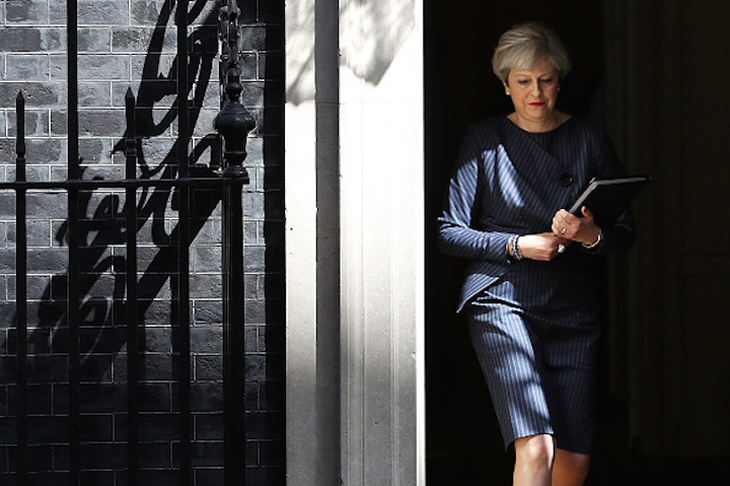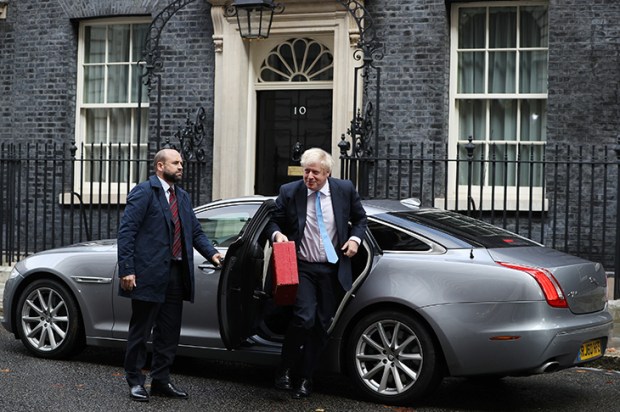Considering that their party is expected to win by a landslide, the Tory spin doctors sound unusually panicked. They are keen to point out that the polls aren’t always right, and the pollsters are still trying to correct what they got wrong at the last general election. They insist that national voting tells you little about what will happen in the key marginal seats. These are normally the pleas of a party that is failing, and trying to persuade voters that it is still in the race. But Labour isn’t doing a good job of spinning its own prospects — so the Tories are doing it for them.
This is not as odd as it first sounds. The Tories are worried about complacency, about their vote not turning out. If voters cannot envisage Jeremy Corbyn in No 10, and don’t take the election seriously, why should they make their way to the polling station and play their part in a Theresa May coronation? As one minister close to the campaign puts it: ‘The risk is exhaustion with politics. That the only people turning up to vote will be hardcore Brexiteers and hardcore Corbynites.’
James Forsyth and Paul Goodman consider May’s new Conservative party:
Their other great worry is that the near-certainty of a Tory victory blunts their attack lines. If Corbyn has no chance of becoming PM, then there’s no risk in voting for your local Labour candidate, or backing the Liberal Democrats. If Corbyn’s finger isn’t going to be on the button, it doesn’t matter that he wouldn’t use the nuclear deterrent in any circumstances. If Labour aren’t going to be in government, it is academic who they would tax more.
So, the Tories need voters to think that Corbyn could, somehow, become Prime Minister. This means that polls which put the Tories on 50 per cent — twice Labour’s support — are rather inconvenient for them. They add to a sense that the only question about this election is how big Theresa May’s majority will be.
The Prime Minister sounds convincing when she insists that, whatever the polls say, there is nothing preordained about the result on 8 June. She is nothing if not a disciplined media performer.
But other cabinet members struggle to keep up the pretence. As one remarked to me this week: ‘I know we’re all meant to be suspicious of the polls. But it is hard when it matches what you’re hearing on the doorstep.’ Indeed, nearly everyone who has been out on the campaign trail reports large-scale Ukip defections to the Tories. Mrs May is immensely popular, with 61 per cent of voters saying she would make the best Prime Minister, while Corbyn is electoral poison.
For all her protestations against complacency, Mrs May’s campaign schedule suggest she too is preparing for a landslide. She has already visited Labour-held seats in London, the north-west, the West Midlands and Wales. Indeed, I’m told that the Tories won’t publish any list of target seats because they don’t want Labour to know precisely where their aims lie. In another sign of how big the Tory majority could be, regional Labour parties have already started to abandon seats that they currently hold as they concentrate their efforts on saving other, safer ones.
A landslide Tory election victory would change both the Tory party and Theresa May’s premiership. If the Tories have MPs for places such as Wrexham, Stoke and Darlington, it will shift the party’s centre of gravity. In crude terms, it’ll move the Tories to the right on Brexit and immigration and to the left on the economy and public services. This is pretty much where May has taken the party since becoming leader.
It is tempting to view this election as being all about Brexit. It certainly will change the negotiating timetable and increase May’s room for manoeuvre on things such as the so-called EU divorce payment and the transitional arrangements. But it won’t change her decision that Britain should leave the single market and the customs union. For that reason, the new MPs won’t really change the debate: the Prime Minister’s mind is already made up.
A shift on the economy would be more consequential. Mrs May’s enthusiasm for an energy price cap and an industrial policy show where her own instincts lie — but until now she has faced opposition from her own cabinet to some of her more interventionist ideas. Armed with her own personal mandate she will be more inclined to put her stamp on policy.
So how might this look? The candidacy of Andy Street, the former boss of John Lewis now running for the mayoralty of the West Midlands, offers some clues. Labour currently has 21 of the 28 parliamentary seats in the region, yet under Street the Tories remain competitive in this race. He is not a classic laissez-faire Conservative but rather someone who talks about the good that comes of the government and the private sector working together. He cites his time running the Local Enterprise Partnership as crucial experience for the job. He says that his politics are based around May’s desire for an ‘economy that works for everyone’. If he wins in the local elections next month it will be a sign that this different, Mayite, brand of Conservatism has electoral potency.
In Tory circles, the chatter is about whether May can get a result to match, or even better, Thatcher’s 1980s landslides. But there is a key difference. Thatcher took advantage of Labour’s weakness to push through a policy agenda that would not have been possible in normal times. May, by contrast, wants to occupy the centre ground so that Labour can never move back on it.
If May can secure a Thatcher-style landslide, it is not certain that Labour will recover. In the ’80s, Scottish Labour played a key role in the party’s return to sanity. But that section of the party is now trying to save its only MP. Some of the unions also did their bit. However, the re-election of Len McCluskey as the leader of Unite, albeit by a narrow margin, is a reminder that they no longer play their former stabilising role.
All of which means that this election is likely to result in a long-lasting change for the Conservatives — because a Tory party that represents more of the nation will be more of a one-nation party.
Got something to add? Join the discussion and comment below.
Get 10 issues for just $10
Subscribe to The Spectator Australia today for the next 10 magazine issues, plus full online access, for just $10.
You might disagree with half of it, but you’ll enjoy reading all of it. Try your first month for free, then just $2 a week for the remainder of your first year.















Comments
Don't miss out
Join the conversation with other Spectator Australia readers. Subscribe to leave a comment.
SUBSCRIBEAlready a subscriber? Log in